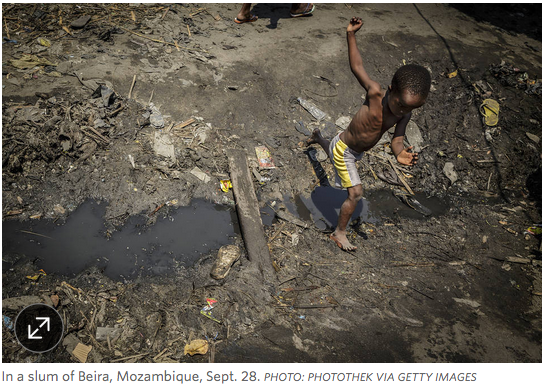This Child Doesn’t Need a Solar Panel
Spending billions of dollars on climate-related aid in countries that need help with tuberculosis, malaria and malnutrition.
In the run-up to the 2015 U.N. Climate Change Conference in Paris from Nov. 30 to Dec. 11, rich countries and development organizations are scrambling to join the fashionable ranks of “climate aid” donors. This effectively means telling the world’s worst-off people, suffering from tuberculosis, malaria or malnutrition, that what they really need isn’t medicine, mosquito nets or micronutrients, but a solar panel. It is terrible news.
On Oct. 9, World Bank President Jim Yong Kim pledged a one-third increase in the bank’s direct climate-related financing, bringing the bank’s annual total to an estimated $29 billion by 2020. In September, Chinese President Xi Jinping pledged to match President Obama’s promised $3 billion in aid to the U.N.’s Green Climate Fund. Meanwhile, the U.K is diverting $8.9 billion from its overseas aid budget to climate-related aid over the next five years, and France is promising $5.6 billion annually by 2020, up from $3.4 billion today. The African Development Bank is planning to triple its climate-related investments to more than $5 billion a year by 2020, representing 40% of its total portfolio.
All these pledges had their genesis in the chaos of the Copenhagen climate summit six years ago, when developed nations made a rash promise to spend $100 billion a year on “climate finance” for the world’s poor by 2020. Rachel Kyte, World Bank vice president and special envoy for climate change, recently told the Guardian (U.K.) newspaper that the $100 billion figure “was picked out of the air at Copenhagen” in an attempt to rescue a last-minute deal. Yet achieving that arbitrary goal is now seen as fundamental to the success of the Paris summit.
This is deeply troubling because aid is being diverted to climate-related matters at the expense of improved public health, education and economic development. The Organization for Economic Cooperation and Development has analyzed about 70% of total global development aid and found that about one in four of those dollars goes to climate-related aid.
In a world in which malnourishment continues to claim at least 1.4 million children’s lives each year, 1.2 billion people live in extreme poverty, and 2.6 billion lack clean drinking water and sanitation, this growing emphasis on climate aid is immoral.
Not surprisingly, in an online U.N. survey of more than eight million people from around the globe, respondents from the world’s poorest countries rank “action taken on climate change” dead last out of 16 categories when asked “What matters most to you?” Top priorities are “a good education,” “better health care, “better job opportunities,” “an honest and responsive government,” and “affordable, nutritious food.”
According to a recent paper by Neha Raykar and Ramanan Laxminarayan of the Public Health Foundation of India, just $570 million a year—or 0.57% of the $100 billion climate-finance goal—spent on direct malaria-prevention policies like mosquito nets would reduce malaria deaths by 50% by 2025, saving an estimated 300,000 lives a year.
Providing the world’s most deprived countries with solar panels instead of better health care or education is inexcusable self-indulgence. Green energy sources may be good to keep on a single light or to charge a cellphone. But they are largely useless for tackling the main power challenges for the world’s poor.
According to the World Health Organization, three billion people suffer from the effects of indoor air pollution because they burn wood, coal or dung to cook. These people need access to affordable, reliable electricity today. Yet too often clean alternatives, because they aren’t considered “renewable,” aren’t receiving the funding they deserve.
A 2014 study by the Center for Global Development found that “more than 60 million additional people in poor nations could gain access to electricity if the Overseas Private Investment Corporation”—the U.S. government’s development finance institution—“were allowed to invest in natural gas projects, not just renewables.”
Addressing global warming effectively will require long-term innovation that will make green energy affordable for everyone. Rich countries are in a rush to appear green and generous, and recipient countries are jostling to make sure they receive the funds. But the truth is that climate aid isn’t where rich countries can help the most, and it isn’t what the world’s poorest want or need.
Mr. Lomborg, director of the Copenhagen Consensus Center, is the author of “The Skeptical Environmentalist and Cool It
Source: Bjorn Lomborg, http://www.wsj.com
 Listen Online
Listen Online Watch Online
Watch Online Find a Station in Your Area
Find a Station in Your Area









 Listen Now
Listen Now Watch Online
Watch Online
